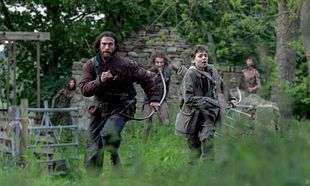Austin Powers and Meet The Parents director Jay Roach turns his hand to more serious material for this biopic of screenwriter Dalton Trumbo who won two Oscars (for Roman Holiday, fronted by screenwriter pal Ian McLellan Hunter, and The Brave One, the former, under the name Robert Rich) despite being blacklisted in 1947. While touching on the more interesting aspects of the man’s career Trumbo is unfortunately as broad as Roach’s comedies.
Trumbo (Cranston) is painted as an amiable fellow, keeping a smile even though his director scolds him on set because he’s a member of the American Communist Party. Everyone’s pal, he helps the rest of the Hollywood Ten (including Louis CK’s Arlen Hird) financially, who like himself are fired from MGM for their lefty leanings, when they are handed subpoenas from the House of Un-American Activities Committee. He remains a gentleman when faced with libellous accusations from the likes of John Wayne (David James Elliot) and powerful Hollywood gossip columnist Hedda Hopper (Mirren). Trumbo refuses to give the names of his fellow communists and, after a stint in prison, is forced to write under various nom de plumes for John Goodman’s shlocky b-movie production company – “We got a gorilla costume… can we use it?” – who impose on him impossible deadlines.
Trumbo is a film of two halves. The first half feels like it was culled from Wikipedia, landing on the important talking points without digging under the surface. There’s never a sense of who Trumbo is or what makes him tick as the story jumps from one big headline story to the next; at times it feels like an endless succession of recreated newsreel footage. The dialogue too is rather bald with every line there to surface the quick-moving story.
The second half, however, has a bit more meat on its bones. The story settles down once Trumbo is released from prison and his workload begins to affect his home life; it’s as if writer John McNamara (Lois & Clark), adapting Bruce Cook’s book, has finally found a way into his subject. Wife Diane Lane (criminally underused) isn’t too pleased with the work-pay ratio and teenage daughter Elle Fanning clashes with her now-monstrous father who is even unwilling to come out of the bath (where he writes) for her birthday as he hammers out bad script after bad script. It’s only when Kirk Douglas (Dean Gorman) and Otto Preminger (Christian Berkel) hire him to write under his real name that the blacklist loses credibility.
Despite the dad-daughter relationship forming a strong backbone for the home straight (forgetting that it really should have been about the freedom of speech), it’s Mirren as Hopper, heading up the Motion Picture Alliance for the Preservation of American Ideals, who has the liveliest of scenes, revelling in a nasty side that’s rarely seen. Cranston is solid, particularly during his not-so-nice moments but there isn’t enough of them and he can’t elevate Trumbo beyond his grand speeches.



















































































